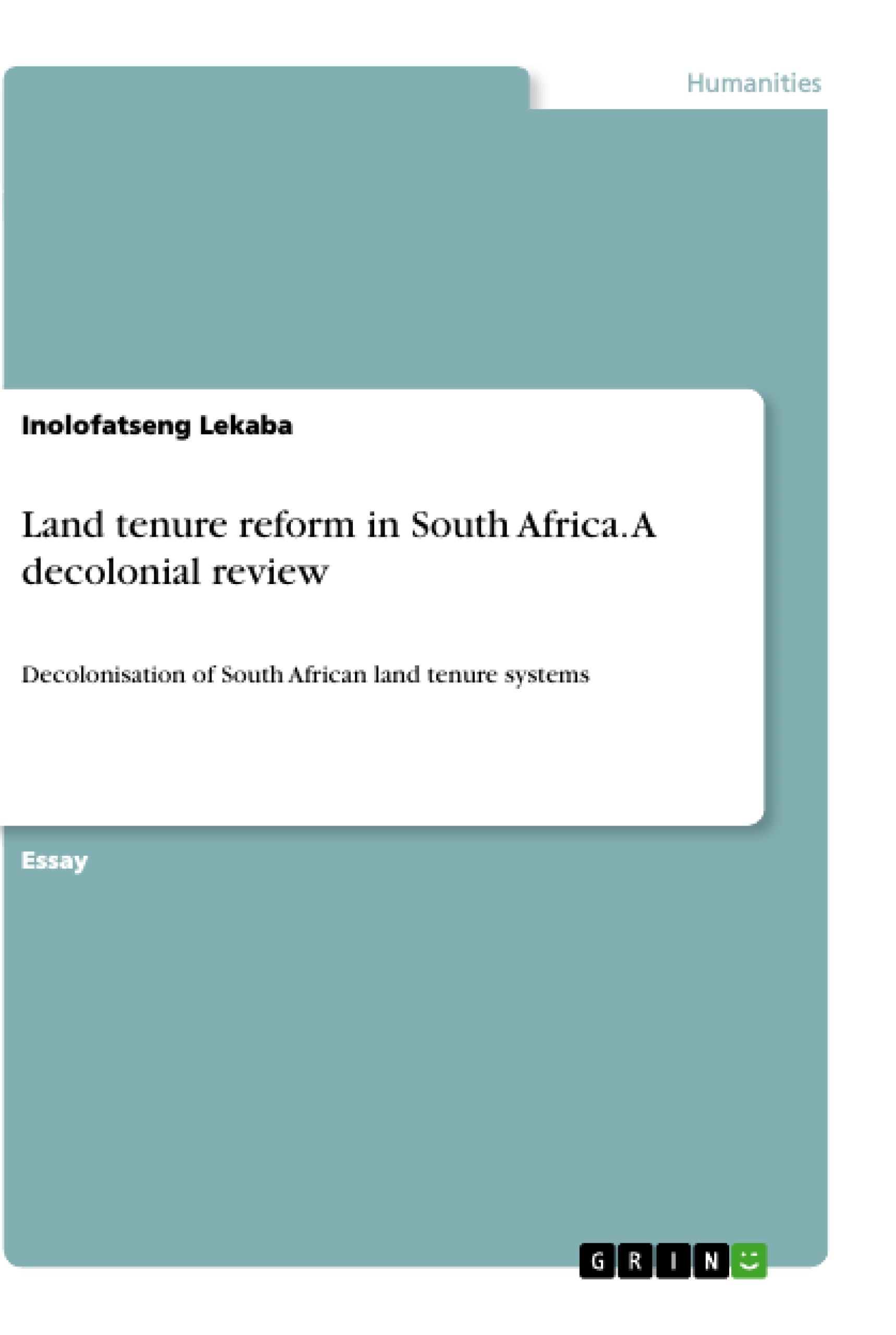The historical dispossession of ‘native’ land dates back to the colonial era and was reinforced and exacerbated by the apartheid Natives Land Act of 1913. The enactment of this Act saw the unequitable redistribution of land with black people only being afforded 7% of arable land. More significantly, the Act facilitated the creation of enclaves for the Black majority with the restriction on land ownership and socio-economic mobility (South African History Online, 2013). Hence, the democratic government from the year 1994 was faced with the monumental task of redressing this imbalance in land ownership and ensuring that the previously disadvantaged do not continue to be discriminated against with regards of land tenure in the country. However, land tenure reform for communal land has been marred with disputes pertaining to African tenure systems versus those influenced by colonial structures. In this regard, this paper seeks to highlight the need to decolonise communal land tenure reform for the improved implementation of rural development plans.
Inhaltsverzeichnis (Table of Contents)
- The research problem
- Rationale for the study
- Theoretical framework: Coloniality, modernity and the decolonial theory
- Land reform in South Africa
- Restitution
- Redistribution
- Communal land tenure reform
- Decolonising land reform
Zielsetzung und Themenschwerpunkte (Objectives and Key Themes)
This paper aims to highlight the need for a decolonial approach to communal land tenure reform in South Africa, with the objective of improving the implementation of rural development plans. The paper argues that the colonial legacy continues to influence land reform policies, leading to ineffective and unjust outcomes.
- The persistence of colonial land ownership structures and their impact on rural development
- The need to decolonize land reform and incorporate traditional African land tenure systems
- The challenges of implementing land reform policies that are informed by colonial theories and ideologies
- The importance of empowering rural communities and ensuring their participation in land reform processes
- The role of customary law in securing land rights for communities and individuals
Zusammenfassung der Kapitel (Chapter Summaries)
- The research problem: This chapter outlines the historical context of land dispossession in South Africa and the challenges faced by the post-apartheid government in addressing the issue of land inequality. It highlights the need for a decolonial approach to land reform.
- Rationale for the study: This chapter examines the shortcomings of existing land reform policies and legislation, arguing that they are based on Western models of land tenure that are not suitable for the African context. It highlights the need for policies that recognize and respect traditional African land tenure systems.
- Theoretical framework: Coloniality, modernity and the decolonial theory: This chapter introduces the concept of coloniality and explains how it continues to influence land ownership structures and policies. It discusses the importance of decolonial theory as a framework for understanding and addressing the legacy of colonialism.
- Land reform in South Africa: This chapter provides an overview of the different pillars of South African land reform, including restitution, redistribution, and tenure reform. It discusses the challenges and complexities associated with each pillar, focusing on the need for a more just and equitable approach to land ownership.
- Decolonising land reform: This chapter emphasizes the importance of incorporating customary law into land reform policies. It argues that a decolonial approach is necessary to ensure that land reform benefits rural communities and empowers them to control their land and resources.
Schlüsselwörter (Keywords)
This paper focuses on the key concepts of land tenure reform, decolonization, coloniality, customary law, and rural development in the context of South Africa. The analysis explores the historical context of land dispossession and the challenges of implementing land reform policies that are informed by colonial theories and ideologies. The paper emphasizes the need to decolonize land reform, incorporate traditional African land tenure systems, and empower rural communities to participate in land reform processes.
Frequently Asked Questions
What is the historical basis for land dispossession in South Africa?
Dispossession dates back to the colonial era and was codified by the Natives Land Act of 1913, which limited black ownership to only 7% of arable land.
What are the three pillars of South African land reform?
The three pillars are land restitution, land redistribution, and communal land tenure reform.
What does 'decolonizing' land reform mean?
It involves moving away from Western-centric models of land ownership and incorporating traditional African tenure systems and customary law into policy.
Why has communal land tenure reform been difficult?
Reform has been marred by disputes between traditional African systems and structures influenced by colonial history and modernity.
What is the role of customary law in this context?
Customary law is seen as a vital tool for securing the land rights of rural communities and empowering them to control their own resources.
- Citar trabajo
- Inolofatseng Lekaba (Autor), 2016, Land tenure reform in South Africa. A decolonial review, Múnich, GRIN Verlag, https://www.grin.com/document/511829



